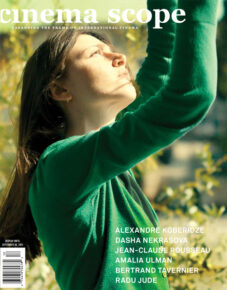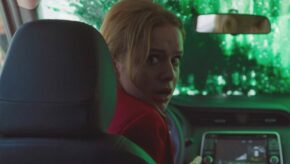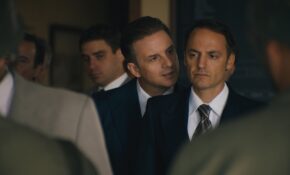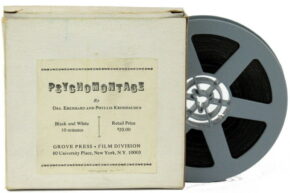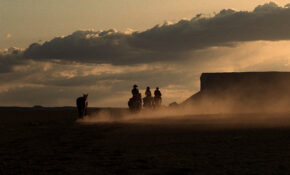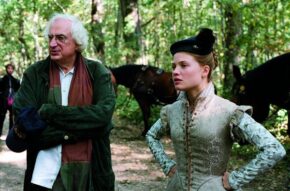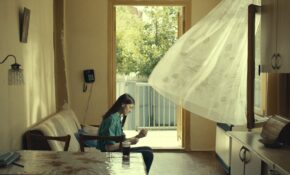CS87
Issue 87: Table of contents
By Cinema Scope | 06/15/2021 | CS87, From Cinema Scope Magazine, Table of Contents
Alexandre Koberidze, Dasha Nekrasova,Radu Jude, Amalia Ulman, Monte Hellman, TV or not TV, Eberhard and Phyllis Kronhausen, Azor, New Order, Siberia
Read More → Siberia (Abel Ferrara, Italy/Germany/Mexico/Greece/UK)
By Michael Sicinski | 06/15/2021 | CS87, Currency, From Cinema Scope Magazine
Abel Ferrara is a changed man. While the evidence suggests that this is very good news for Ferrara himself and his immediate family, it could result in a minor schism in the manner in which his films are received. For most of his career Ferrara has been the subject of a Romantic cult that glorified his legendarily self-destructive behaviour, and often read this (literal) lawlessness as an integral part of his renegade creative vision.
Read More → New Order (Michel Franco, Mexico/France)
By Adam Nayman | 06/15/2021 | CS87, Currency, From Cinema Scope Magazine
“Mexico’s upper classes are asking for trouble,” Michel Franco told Variety last fall. With New Order,trouble has found them. The deep-crimson dress selected by prosperous newlywed Marianne (Naian González Norvind) for the lavish post-wedding party at her family’s spotless steel-and-glass estate is couture at its most ominous; don’t look now, but there will be blood.
Read More → Azor (Andreas Fontana, Switzerland/France/Argentina)
By Jay Kuehner | 06/15/2021 | CS87, Currency, From Cinema Scope Magazine
Mark Twain’s quote that virtue has never been as respectable as money could easily delineate the sumptuously sordid habitat limned in Azor, except that it's precisely the kind of wisdom that the film’s wealthy habitués and their attendant financiers might invoke with complacent irony from within their insulated milieu of smoky parlours, agapanthus-lined lobbies, manicured hippodromes, and dutifully swept piscinas.
Read More → Exploded View | Eberhard and Phyllis Kronhausen’s Psychomontage No. 1
By Chuck Stephens | 06/15/2021 | Columns, CS87, Exploded View, From Cinema Scope Magazine
People get naked, lips are smacked, groping ensues; macroscopic pondlife lick and suck, bomber pilots release their loads. In ten neurotic minutes, the movie climaxes again and again. Come-on, or plain comedy? Evocative of Ovid, or an altogether obvious joke? Take it off! Take it all off! Take my associative montage…please!
Read More → TV or Not TV | Neutrality is Not an Option: Raoul Peck’s Exterminate All the Brutes
By Robert Koehler | 06/15/2021 | Columns, CS87, From Cinema Scope Magazine, TV or not TV
In the fourth and final episode of Exterminate All the Brutes, Raoul Peck declares in his commanding voiceover narration, “The very existence of this film is a miracle.” Those are mighty big words for a filmmaker to say about his own work—it’s hard to imagine even the always self-impressed Godard making such a statement—but by the end of Peck’s grand yet accessible essay film, the viewer can’t argue.
Read More → Deaths of Cinema | Monte Hellman: The Art of Going Nowhere
By Haden Guest | 06/15/2021 | Columns, CS87, Deaths of Cinema, From Cinema Scope Magazine
The late Monte Hellman had a great run in the late ’60s and early ’70s directing an unusual series of low-budget films whose surface resemblance to popular genre pictures belied a smoldering ambition to forge a distinctly American mode of art cinema.
Read More → Remembering Women: Claudia von Alemann’s Blind Spot
By Erika Balsom | 06/15/2021 | CS87, Features, From Cinema Scope Magazine
Cherchez la femme, they say. It sounds nice, but what this expression actually means is that woman is the root of all (male) problems, always to blame. Claudia von Alemann’s extraordinary Blind Spot (Die Reise nach Lyon, 1980), recently restored by the Deutsche Kinemathek in cooperation with the Institut Lumière, is a rare film that puts the pursuit of a woman at its heart—not so that she can be punished, not so that a man’s troubles can be explained, but so that her achievements might be rescued from oblivion and might, in the process, change another woman’s life.
Read More → Common Sense Connoisseur: The Critical Legacy of Bertrand Tavernier
By Christoph Huber | 06/15/2021 | CS87, Features, From Cinema Scope Magazine
The two most cherished film books in the pile on my bedside table are in a language my command of which is rudimentary at best. But since both Jacques Lourcelles’ Dictionnaire du Cinéma – Les Films as well as Jean-Pierre Coursodon and Bertrand Tavernier’s 50 ans de cinéma américain have never been translated from French into either English or German, I gladly make do, filling the gaps with a mixture of autodidactic guesswork and occasional dictionary consultation, which for all its drawbacks has proved to be a viable method.
Read More → “I prefer, where truth is important, to write fiction:” On Radu Jude
By Phil Coldiron | 06/15/2021 | CS87, Features, From Cinema Scope Magazine
In the name of the popular, delighting in reduction and obviousness, a boring assertion: the common ground of every film movement christened a “new wave” over the last 70 years has tended toward revision, a self-conscious desire to provide a true image of the people in opposition to the distorted picture given by whatever relevant iterations of official culture. The banality of this claim can be measured by the volume of cant and platitude produced in support of it, often by the artists themselves. There is, I hope, little need to rehearse these arguments regarding realism, myth, and so on. Who today can help but squirm when faced with the phrase “true image of the people?”
Read More → Can’t Get You Out of My Head: Dasha Nekrasova on The Scary of Sixty-First
By Gabrielle Marceau | 06/15/2021 | CS87, From Cinema Scope Magazine, Interviews
Stanley Kubrick’s Eyes Wide Shut (1999) was, ostensibly, a film that couched a meditation on the mundane topic of marriage and mistrust in mysterious extravagances (operatic orgies, hints of the occult, dream logic). Watching it now, it’s abundantly clear that the film is actually most trenchant in its treatment of class, corruption, and the sexual penchants of an invincible, monied elite (embodied by Sydney Pollack).
Read More → It Happened One Night: Alexandre Koberidze on What Do We See When We Look at the Sky?
By Jordan Cronk | 06/15/2021 | CS87, From Cinema Scope Magazine, Interviews
Just past the midpoint of Alexandre Koberidze’s What Do We See When We Look at the Sky? the narrative pauses for a five-minute montage of children playing European football on the blacktop of a fenced-in basketball court. Accompanied by Gianna Nannini’s 1990 FIFA World Cup anthem “Un’estate italiana,” the scene, which plays out entirely in slow motion, is at once part and parcel of this highly musical film’s many interludes and the most conspicuous of its untold number of narrative culs de sac.
Read More → Editor’s Note: Cinema Scope Issue 87
By Mark Peranson | 06/15/2021 | Columns, CS87, From Cinema Scope Magazine
Perhaps it’s premature to proclaim “Cinema is back!” to quote a certain French festival director, or maybe it’s more accurate to say that it never went away. Even though theatres are only now reopening in many countries (at the time of writing indoor cinemas remain closed in Toronto, unfortunately), I dare say that over the past year we were all exposed to more moving images (and alcohol) on a regular basis than at any other moment in human history…some of it, yes, not exactly cinema as we are used to defining it.
Read More → Brief Encounters: Hamaguchi Ryusuke’s Wheel of Fortune and Fantasy
By Beatrice Loayza | 06/15/2021 | CS87, Features, From Cinema Scope Magazine
Sprawling, intimate conversations are crucial in the dialogue-driven films of Hamaguchi Ryusuke, but that which remains concealed—simmering behind a strategic facade, sheepish deception, or playful pretense—can be just as revealing. Consider the pivotal dinner conversation that takes place after a communication workshop in the 317-minute Happy Hour (2015), when Jun (Kawamura Rira) suddenly discloses the shocking news of her upcoming divorce trial and owns up to her infidelity to her callous husband
Read More → 
